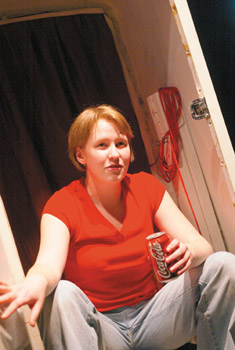 |
|
|||||||||
|
At song’s end Perdue places the refrigerator in the stage’s back-right corner, looks down in defeat, opens the door, and takes out a can of Coke. Sitting inside the almost empty, shelfless refrigerator and breathing heavily from her dance, Perdue addresses the audience: “You have a pancreas, and I have a pancreas. Yours works, and mine doesn’t. Would you like to give me your pancreas?” So opens the diabetic’s one-woman show, “If Only You Had a Little Discipline, You’d Be Fine,” performed the second weekend in May in the Reynolds Club’s first-floor theater. Perdue, an interdisciplinary-studies-in-the-humanities concentrator, began writing the show last summer, when a $1,500 Summer Arts Fellowship paid her rent and freed her from finding a job. The Boston native created a makeshift office at University Theater (UT) and made herself write for at least two hours a day. After many drafts during the academic year, the hour-long show, Perdue’s B.A. project, won the College’s Olga and Paul Menn Foundation first prize for playwriting. One of five Summer Arts Fellowships awarded by the University’s Arts Planning Council in the fellowship program’s first year, the grant gave Perdue forced writing time. “I had never had to do that before,” she says. “Last summer was one of the most amazing summers for me.” Having the luxury to pursue her own work “opened up a new way of thinking about what I can do with my skills as a performing artist,” she says. Planning to stay in Chicago and audition for local shows after graduation, Perdue now believes, “If I don’t get cast in shows next year, I can always cast my own projects. That ownership is really incredible.” Another grant winner, fourth-year Sarah Vogel, spent last summer creating ten issues of an absurdist zine she called AntiDown, named for a type of quark. Vogel distributed her zine—which included collages, original writing, essays, scientific reports, drawings, and miscellaneous contributions from students and faculty members—through a cigarette machine in the Ex Libris coffee shop. “It was great being able to have my work on campus,” Vogel, an interdisciplinary-studies-in-the-humanities concentrator, says. She liked the idea of “people having a little piece of art to carry around with them.” And the grant, she says, showed her how to create “really low-budget art,” something she plans to continue doing. Her latest project is pasting the beginnings of Reader personal ads into matchbooks. “Smoking is a way to meet people,” Vogel, a nonsmoker, says. “The idea of having the beginning of a conversation inside matches you might share with someone seemed pretty perfect.” After graduation the Hartland, Michigan, native plans to move to Albuquerque with her boyfriend and apply for jobs with the local children’s museum or botanical gardens. This year the Arts Planning Council planned to offer up up ten $1,500 grants, says law professor Douglas Baird, art enthusiast and council chair. He hoped the Summer Arts Fellowship subcommittee would receive even more than last year’s 25 applications by the May 30 deadline. Winners were to be announced at month’s end. “Focusing on individual students has been important,” Baird says. “It raises awareness of the arts among the University. It’s a good experience for the students, for the life of the school.” Last year Baird and fellow subcommittee members David Levin, associate professor in the Committee on Cinema & Media Studies, and Heidi Coleman, UT director, reached consensus easily to pick the five winners. “We thought some were riskier than others,” Baird says, which put them ahead of the rest. Perdue’s show certainly holds both physical and emotional risks. Diagnosed with type-A diabetes at age 8, during the show she injects herself with insulin (actually saline), portrays a 16-year-old with a crush on her doctor, and details her childhood fantasy of a normal life free of sickness. She switches from autobiographical to fantasy characters: an 11-year old girl tells a coming-of-age story, a doctor demonstrates how to inject a diabetic who’s passed out, and a man relates a skydiving experience. She dances the tango, faux rose in clenched teeth, with the refrigerator—a symbol of her relationship with food (carbohydrates rule her blood sugar) as well as a sign of industrialization. “We live under false circumstances,” Perdue says. “In the natural world I should have died. Refrigeration is a small example of that.” Not that she wants to be seen as a victim; in fact, she read scores of disease-related works for ideas on how to avoid exploiting her condition. Still, after one of her dance numbers Perdue sits down and tells the audience that strenuous exercise causes her blood sugar to fall, which is why she must sit. A few scenes later her skydiving character, who tells a comical story about an Elvis-like pilot and two “honeys” singing doo-wop, revels in his flying experience. Rather than fighting the disease, he represents the metaphor of surrendering to it. As Perdue puts it: “He’s about rising above it all.” —A.B.
|
|
Contact
|


